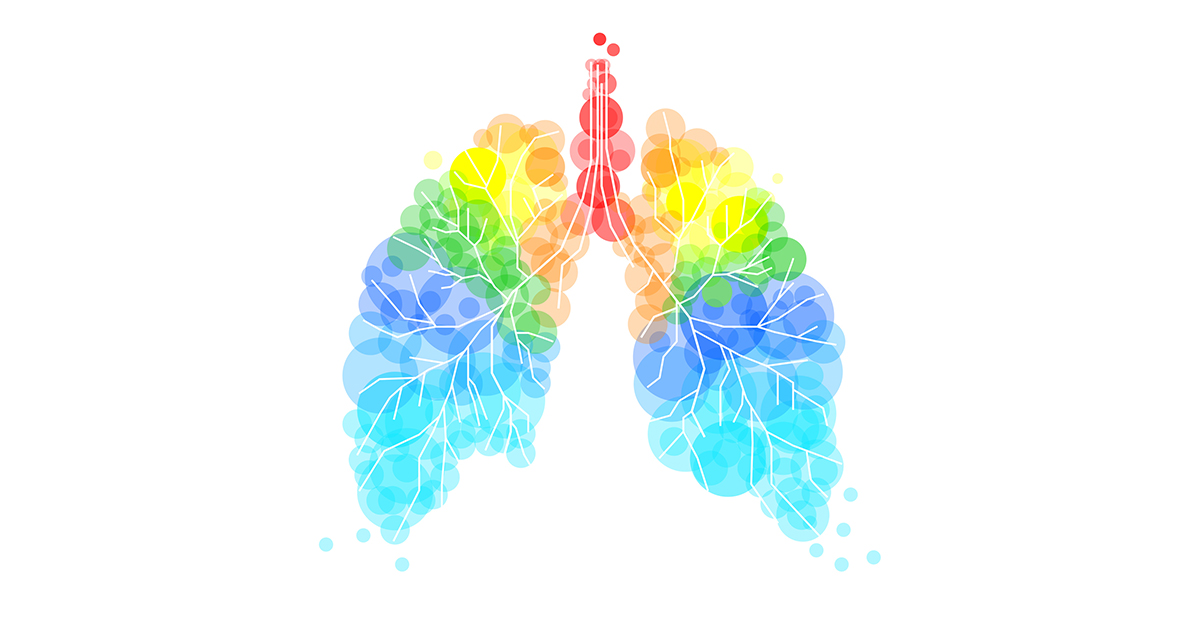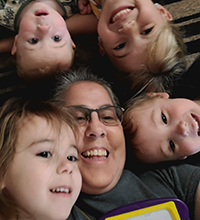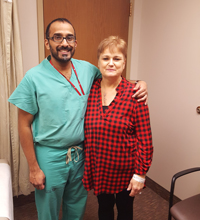What it's like to have a lung transplant

Most of us would never imagine that we would someday need an organ transplant. But yet, more than 40,000 people in the United States receive a life-saving organ transplant each year, and more than 100,000 people are on the waiting list.
You can only imagine the flurry of emotions, anxiety and fear one must experience when receiving the news that they need an organ transplant.
Nebraska Medicine is a regional leader in solid organ transplantation with programs in heart, liver, kidney, intestine, pancreas and lungs. Our lung transplant program, which started in 2016, is the only program in Nebraska and provides life-saving lungs for individuals with end-stage lung disease in the state and the surrounding region.
Our program typically offers shorter wait times than other programs – averaging 1.5 months to transplant vs. 3 to 4 months nationally. This is possible for several reasons.
"We embrace new technology that allows us to transplant from certain subgroups of donors that might be turned down by other medical centers," says Aleem Siddique, MBBS, Nebraska Medicine transplant surgeon.
These donors include donation after circulatory death (DCD) lungs. This procedure involves lungs donated by a person who suffers a severe, irreversible illness and dies after medical treatments are stopped and their heart stops beating. Our transplant team then evaluates the lungs. Once transplanted, lungs from DCD perform just as well as lungs from donation after brain death (DBD), says Dr. Siddique.
A technology used by the Nebraska Medical Center, called "lung in a box," also increases the transplant team's ability to use more organs. "Lung in a box" means the lungs are transported in a box with technology that continues to pump blood and airflow through the lungs until it is ready for transplant. "This gives us more confidence in using lungs that we might not otherwise use and also extends the life of the lungs," says Dr. Siddique.
These factors may have helped save the lives of 55-year-old Cheryl Campe of Cherokee, Iowa, and 56-year-old Karen Rydstrom of North Sioux City, South Dakota, who both received double lung transplants within the last two years at the Nebraska Medical Center.
These two brave ladies talk about their experiences and what it's like to have a transplant.
How did you feel when you received the news that you needed an organ transplant?
While processing the fact that you need an organ transplant can be scary and stressful, both ladies agree that it was also a relief.
Campe, who received a double lung transplant on Nov. 26, 2019, recalls a flood of emotions. "I was scared to death," says Campe, who required 24/7 oxygen. "I was in bad condition. My family didn't think I was going to make it. When I was put on the organ waiting list, I thought, ‘I finally have a chance for life.'"

Rydstrom, who received a double lung transplant on Dec. 7, 2019, says she too had reached the end of her rope. "I was completely dependent on oxygen," recalls Rydstrom, whose lung capacity had dropped to 26% during her wait for an organ. "Breathing was difficult. It was hard to get through a shower without my oxygen. I could barely bend over without getting out of breath. I knew I had to do something if I wanted to be around much longer."
What is it like to be on the organ waiting list?
"The anxiety is unreal," says Campe. "It was like an emotional rollercoaster for me and my whole family. You can't shut it out of your head. I couldn't really go anywhere because they don't want you to get sick, as then you might be taken off the waiting list. Plus, you need to be within a 4-hour drive from the Nebraska Medical Center at all times, and you always have to have a packed bag with you, so you are ready to go."
After being on the waiting list for 18 months at another Midwest medical center, Campe decided to come to the Nebraska Medical Center to dual list for a lung transplant. She received "the call" that a donor's lungs were available approximately one month later.
"Deep down, I didn't think I was going to get a transplant," recalls Campe. "I was starting to give up hope."
Rydstrom was also on the lung organ transplant list at another medical center in the Midwest for two and a half years before she came to Nebraska Medical Center. "I was very anxious," says Rydstrom, as her lungs continued to decline. "I could barely do anything anymore. I felt like I was waiting and waiting for that call. Every time my phone rang, I'd look at the number and answer every call, hoping this might be the one."
This time, Rydstrom only had to wait about a month before she received "the call."
What is it like to receive "the call" that an organ is available?
After being on the waiting list for 18 months at another hospital and never getting a call, Campe was surprised when she received "the call" just one month after listing with the Nebraska Medical Center.
"It was the most wonderful feeling when I got the call," recalls Campe. "I was scared, but I knew I had nothing to lose. I knew that without the transplant, I would die. I was so emotional I couldn't breathe. My husband had to carry me to the car."
When she and her husband, Kevin, arrived at the hospital, they were told several hours later that the lungs were not suitable for a transplant. "It devastated us all," recalls Campe.
The second call came just a little over a week later. "I was still disappointed from the first call, so I didn't think it was really going to happen," recalls Campe. She and Kevin arrived at about 2 p.m. By 10 p.m., it was confirmed, the lungs were good. "I was emotionally drained by then," Campe says.
When Rydstrom received "the call," she says, "I was ecstatic and shaking. I drove down with my boyfriend, but I had to drive so I could keep myself occupied."
Unfortunately, shortly after Rydstrom arrived, she was told that the lungs were not viable. "It was very disappointing," she says. "I cried, my kids cried. But we got through it. ‘There's going to be another one, I told myself.'"
About a month later, Rydstrom received a second call. "I didn't get as excited this time, knowing that there was the possibility that the lungs would not be good." It turns out that Rydstrom's intuition was correct. The lungs had to be turned down a second time.
The third time was the charm. "My nurse coordinator called me to tell me they had a match again and would call back in a bit to confirm before I started the drive to Omaha. It took an hour and a half before they called back. But when she did, she said Dr. Siddique told her to assure me that this time the lungs were perfect. That was the longest hour and a half I've ever lived through! It was 7:45 p.m. when they called again, and I needed to be at Nebraska Medical Center by 10 p.m. We were very nervous to say the least!"
The "lung in a box" was also used in Rydstrom's case, which helped improve the chances that the lungs would be good.
All of Rydstrom's children and grandchildren met her at the Nebraska Medical Center and were by her bedside before she was taken to surgery. My last words were, ‘I love you.' A calm came over me because I knew I was being taken care of by the best of hands and everything was going to be okay."
What does a transplant feel like?
"It was a wonderful experience," recalls Campe, who says it was better than she could have ever imagined. "I was scared to death to get a transplant. I thought I would be in pain with every breath I took for the rest of my life. I didn't think it was going to change things that much."
But when Campe awoke from surgery, she knew immediately that she had been wrong. "I could breathe again. And while my incision hurt, I didn't feel any pain inside of me. It was nothing like I thought. I started feeling better fairly quickly and was up and walking by the third day after surgery."
Rydstrom says she was also surprised at how good she felt after surgery. "I was sore, but It felt so good to be able to breathe again."

Aleem Siddique, MBBS
She was also out of bed and walking by the third day after surgery and left the hospital on the ninth day. "I don't feel like I had a transplant," she says. "I can do whatever I want now. I just have to be careful about how much I lift. I used to have to carry three tanks of oxygen with me wherever I went. Those days are gone."
What is recovery like?
All lung transplant patients are required to stay in Omaha post-transplant for a three-month recovery and rehabilitation program.
"I was very weak at first," Campe recalls, "but started gaining back my strength fairly quickly. They had me walking, bicycling and doing strengthening for my rehab. I felt like I was ready to go home after two months, but they made me stay the entire three months."
Before the transplant, Campe could barely walk a mile, even with her oxygen. By the end of rehab, she was walking six miles a day. "I don't hold back at all now," says Campe. "I can play with my grandkids now and hold them. I cry a lot about the things I can do now. It feels absolutely wonderful."
Rydstrom's recovery was a little more difficult. After surgery, she started to develop pain in her back, which ended up being a blood clot in her lung. It was dissolved with medication.
About a month later, she developed severe reflux. It was discovered that her left lung had filled with fluid and had to be drained. Eventually, Rydstrom also worked up to walking six miles a day and continues to walk and exercise regularly.
"I could barely walk before the transplant without getting out of breath," says Rydstrom. "I couldn't clean. Even going to the grocery store was difficult. To not be out of breath anymore – it's the best feeling."
What was your support like throughout the transplant process?
After a patient is referred to Nebraska Medicine to be evaluated as a potential lung transplant recipient, one of the first people they meet is the nurse transplant coordinator. Throughout the presurgical, surgical and post-transplant recovery, the nurse coordinator becomes the patient's primary care coordinator and liaison to the rest of the transplant team. The nurse coordinator is available by phone around the clock and is responsible for scheduling tests, screenings, appointments, answering calls from patients, troubleshooting, providing education and ensuring the patient has all the necessary tools and support and is receiving all of the appropriate care.
"We are like the helicopter mom to all of our lung transplant patients," says Bobbi Heffelfinger, MSN, MBA, RN, lead nurse and lung transplant coordinator. "We get to know the patients like family and will follow them for the rest of their lives."
"The care at the Nebraska Medical Center has been absolutely amazing," says Rydstrom. "A nurse transplant coordinator was assigned to me from the beginning and was available to me 24/7 if I had issues or questions. All I had to do was pick up the phone, and if it was after hours, she usually returned my call within 10 or 15 minutes. She always made sure I completely understood everything.
"It was a very good experience despite the fact that I had major surgery. I will never go anywhere else for my medical care."
Campe calls her care coordinator her "go-to" person. "Whenever I needed anything, she always got back to me, even if it was in the middle of the night," says Campe.
"I learned to really trust her and the rest of the transplant team. It was a wonderful feeling to have that trust and confidence when you are going through such a major life experience. I couldn't have asked for a better team of providers. Each person on the team played such an important role in my care and recovery."
What do you wish you would have known before the transplant?
For this question, both Campe and Rydstrom responded with the same answer, "I wish I would have come to the Nebraska Medical Center sooner."
To schedule an appointment with one of our lung specialists, call 800.922.0000.






